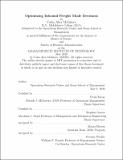| dc.contributor.advisor | Vivek Farias and Stephen Graves. | en_US |
| dc.contributor.author | McIntyre, Colin Alex. | en_US |
| dc.contributor.other | Sloan School of Management. | en_US |
| dc.contributor.other | Massachusetts Institute of Technology. Operations Research Center. | en_US |
| dc.contributor.other | Leaders for Global Operations Program. | en_US |
| dc.date.accessioned | 2020-09-03T15:52:23Z | |
| dc.date.available | 2020-09-03T15:52:23Z | |
| dc.date.copyright | 2020 | en_US |
| dc.date.issued | 2020 | en_US |
| dc.identifier.uri | https://hdl.handle.net/1721.1/126907 | |
| dc.description | Thesis: M.B.A., Massachusetts Institute of Technology, Sloan School of Management, in conjunction with the Leaders for Global Operations Program at MIT, May, 2020 | en_US |
| dc.description | Thesis: S.M., Massachusetts Institute of Technology, Sloan School of Management, Operations Research Center, in conjunction with the Leaders for Global Operations Program at MIT, May, 2020 | en_US |
| dc.description | Cataloged from the official PDF of thesis. | en_US |
| dc.description | Includes bibliographical references (pages 73-74). | en_US |
| dc.description.abstract | Retail manufacturers often expedite inbound freight shipments from contract manufacturing bases to their distribution centers in destination markets at high cost to improve service levels to their wholesale partners and retail arm. The current process around these decisions has yielded lower than anticipated improvements to service level. This thesis (1) reframes the goal of expediting inbound freight in quantitative, measurable terms that more directly impact the business outcomes, (2) develops an optimization model to select a set of freight shipments to expedite and best improve service, and (3) uses the optimization model to estimate potential improvement magnitudes with strategic changes. | en_US |
| dc.description.statementofresponsibility | by Colin Alex McIntyre. | en_US |
| dc.format.extent | 74 pages | en_US |
| dc.language.iso | eng | en_US |
| dc.publisher | Massachusetts Institute of Technology | en_US |
| dc.rights | MIT theses may be protected by copyright. Please reuse MIT thesis content according to the MIT Libraries Permissions Policy, which is available through the URL provided. | en_US |
| dc.rights.uri | http://dspace.mit.edu/handle/1721.1/7582 | en_US |
| dc.subject | Sloan School of Management. | en_US |
| dc.subject | Operations Research Center. | en_US |
| dc.subject | Leaders for Global Operations Program. | en_US |
| dc.title | Optimizing inbound freight mode decisions | en_US |
| dc.type | Thesis | en_US |
| dc.description.degree | M.B.A. | en_US |
| dc.description.degree | S.M. | en_US |
| dc.contributor.department | Sloan School of Management | en_US |
| dc.contributor.department | Massachusetts Institute of Technology. Operations Research Center | en_US |
| dc.contributor.department | Leaders for Global Operations Program at MIT | en_US |
| dc.identifier.oclc | 1191623589 | en_US |
| dc.description.collection | M.B.A. Massachusetts Institute of Technology, Sloan School of Management | en_US |
| dc.description.collection | S.M. Massachusetts Institute of Technology, Sloan School of Management, Operations Research Center | en_US |
| dspace.imported | 2020-09-03T15:52:23Z | en_US |
| mit.thesis.degree | Master | en_US |
| mit.thesis.department | Sloan | en_US |
| mit.thesis.department | OperRes | en_US |
